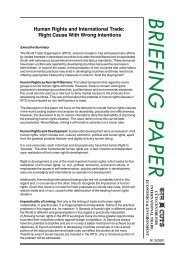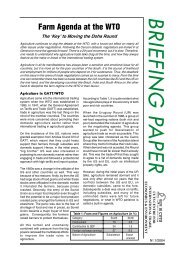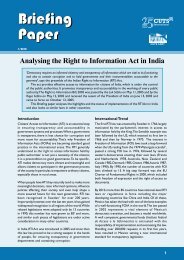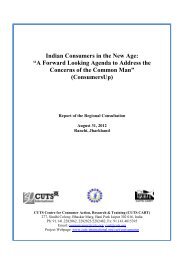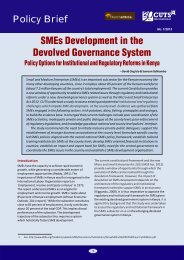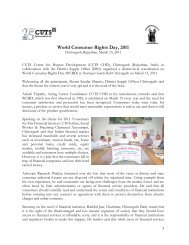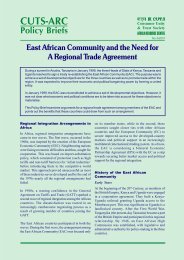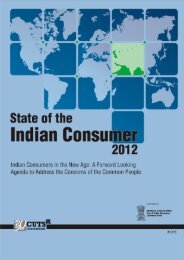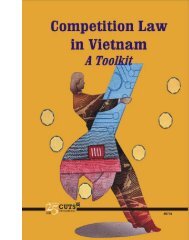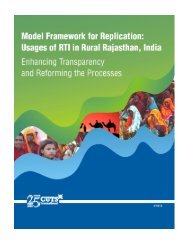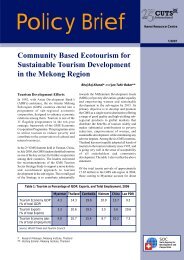Final Report - World Trade Organization
Final Report - World Trade Organization
Final Report - World Trade Organization
Create successful ePaper yourself
Turn your PDF publications into a flip-book with our unique Google optimized e-Paper software.
Chapter-8<br />
Conclusions and Recommendations<br />
This chapter is the concluding part of the final report<br />
of the 7-Up Project titled: “Pulling Up Our Socks”.<br />
The project involved a comparative study of<br />
competition regimes in seven developing countries:<br />
India, Pakistan, Sri Lanka, Kenya, South Africa,<br />
Tanzania and Zambia. It was implemented over 2000-<br />
2002.<br />
Contextual Background<br />
The study showed a huge lack of competition culture<br />
in all the project countries, and the fact that<br />
awareness levels were quite low when the 7-Up<br />
project was taken up. Whatever awareness existed<br />
was mainly among a handful of businesses and<br />
bureaucrats. Few in the media, academia and civil<br />
society were aware, but that too was quite wanting.<br />
Surveys conducted across a section of society in each<br />
of the project countries confirmed this finding.<br />
Fortunately, due to some internal realisation and<br />
external factors, a desire to improve the competition<br />
regime was reflected across all countries. The<br />
external factors include the discussions at the WTO<br />
on trade and competition policy, which were launched<br />
in 1996 and accelerated after the 4 th Ministerial<br />
Conference at Doha in November, 2001.<br />
While the five developing countries: India (1969 and<br />
2002), Pakistan (1971), Sri Lanka (1987 and 2003),<br />
Kenya (1989) and South Africa (1979 and 1998) had<br />
enacted competition laws much before, the two least<br />
developed countries: Zambia (1995) and Tanzania<br />
(1994) were late entrants. Ostensibly they enacted<br />
their laws under pressure from international lending<br />
institutions (ILIs) as a part of structural adjustment<br />
programmes. This did pay well in Zambia, as it was,<br />
within certain limitations, quite effective in curbing<br />
various anti-competitive practices. On the other hand,<br />
the two big ones: South Africa and India developed<br />
new laws in 1998 and 2003 respectively to cope with<br />
the changing times. The Sri Lankan parliament has<br />
also passed a new law in early 2003. However, during<br />
the project implementation it was found that Pakistan<br />
is also in the process of adopting a new law, which<br />
should come about in this year, or latest by 2004. Kenya<br />
is believed to be considering a new law as well.<br />
Tanzaina was a case in point as its 1994 law was<br />
inoperative until recently, and changes were<br />
proposed recently, including the name, to give it a<br />
new thrust. Further, it has received generous financial<br />
assistance from donors to implement the law.<br />
If one looks at other cases of pressure from ILIs,<br />
two cases come to mind. Firstly, Thailand which has<br />
enacted a competition law in 1999, but the<br />
implementation is badly lacking. One factor<br />
responsible for this is the unholy nexus between<br />
politicians and businessmen, and cronyism, which<br />
exists in South East Asia, thus rendering it difficult<br />
to implement the competition law even on a soft<br />
basis. The public is totally ignorant about the law.<br />
The other case is that of Indonesia, where the law is<br />
being looked at as a part of the painful transition<br />
process imposed by the ILIs. Furthermore, Indonesia<br />
has no proper rule of law which also hampers any<br />
sensible governance.<br />
Other than Zambia and South Africa the political will<br />
was lacking badly, which was evident by the budget<br />
and quality of personnel appointed to administer the<br />
law. All other countries were lagging behind<br />
considerably in enforcement of otherwise reasonably<br />
adequate laws. Budgets and appropriate personnel<br />
were major drawbacks in effective implementation.<br />
India has just enacted a new law and the jury is still<br />
out as to how effective it will be. To start with the<br />
budgetary allocations are quite poor, and it has a huge<br />
agenda. The new law has been patterned on the basis<br />
of the new law enacted in the UK, which has gradual<br />
implementation: advocacy in the first year; restrictive<br />
trade practices in the second year and merger review<br />
in the third year. UK too had an old law (1973) when<br />
it changed over to a new law in 1998 to cope with<br />
changing circumstances and to align with the<br />
European Community competition law.<br />
The applicability of the competition law varied from<br />
country to country, depending upon the economic<br />
situation. For example, the South African law has<br />
developed good jurisprudence on mergers, though it<br />
lagged behind in reaching the common man as it did<br />
not address various retail level abuses. On the other<br />
Pulling Up Our Socks w 85



